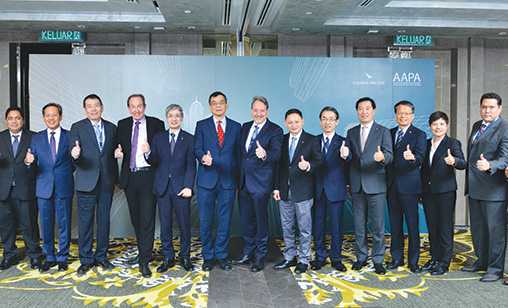News Backgrounder
Wanted: Asian airport and ATM building binge
The Association of Asia Pacific Airlines 63rd Assembly of Presidents did not go to plan in November. The event, scheduled for November 21-22 in Hong Kong, was cancelled because of civil unrest in the city. The region’s airline leaders met at a quickly re-convened Assembly in Kuala Lumpur at the turn of the month. Associate editor and chief correspondent, Tom Ballantyne, reports.
December 1st 2019
Times may be tough for many of the region’s airlines, but the last minute cancellation of their annual talkfest, scheduled this year in politically unruly Hong Kong, did not prevent executives from getting together to debate the industry’s challenges. Read More »
Meeting at the Association of Asia-Pacific Airlines (AAPA) headquarters in Kuala Lumpur a week after Hong Kong was cancelled, members reviewed the critical issues shaping their airlines as the next decade approaches.
 |
AAPA director general, Andrew Herdman, who has announced he will retire in March next year, said AAPA carriers were focused in particular on environment, cybersecurity, infrastructure, slot allocations and shortages, passenger facilitation and taxation.
“The emergence of Asia as a powerhouse driving the global economy in the 21st century creates a sense of optimism for the region’s dynamic air transport industry in the long term,” said Herdman.
“However, success can not be automatically assured without robust efforts to support carriers, who continue to face challenges to achieving strategic development and growth.
“Given the significant contribution air transport makes to wider economic and social development, governments need to adopt a much more positive attitude towards the industry and work meaningfully to remove obstacles that hinder the sustainable growth of the industry.”
The airline leaders met as preliminary traffic figures for the month of October were released. They showed international air passenger demand continued to expand at a moderate pace, demonstrating the industry’s resilience to an easing in global economic activity and despite a weakness in air cargo, Herdman said.
A combined 30.7 million international passengers were carried by the region’s airlines in October, 3.1% more than the same month last year. Continuing a downward trend, international air cargo demand in freight tonne kilometre (FTK) declined by 5.9% year-on-year in October.
Herdman said in the first ten months of the year Asian airlines carried 312 million international passengers, a 4.3% increase compared with October a year ago. Air cargo volumes fell by 5.6%, with trade tensions and geopolitical risks dampening business sentiment and export orders.
Looking ahead, Herdman said: “Asian airlines face continued pressure on margins. Nevertheless, the region’s carriers remain pro-active in identifying measures to control costs in order to maintain overall profitability and are adjusting their route networks to better match demand.”
Many of the perennial problems of the industry received attention at the Assembly.
Member airlines called on Asia’s governments and all industry stakeholders to deliver effective ATM (Air Traffic Management) services to meet present and future operational requirements.
The resolution also asked that States collaborate beyond national borders to enhance air traffic flow management systems and to improve cyber threat awareness, promote cybersecurity culture and strengthen cyber resilience.
With anxieties about the impact of climate change increasing worldwide, AAPA airlines urged governments and industry stakeholders to address aviation’s climate impact and promote sustainable aviation.
The International Civil Aviation Organisation (ICAO) agreed to CORSIA (Carbon Offsetting Scheme for International Aviation) in 2016. It is being implemented in almost 30 countries and emissions reporting by all international carriers have begun full emissions reporting from January.
Another familiar theme at the gathering was the case airlines put to governments, usually unsuccessfully, to reduce taxes and charges on airlines. An AAPA statement issued at the conclusion of the meeting said: “Recently introduced or increased taxes on air travel include Malaysia’s Departure Levy, the New Zealand International Visitor Conservation and Tourism Levy and the imposition of various levies by governments, including France, Germany, the Netherlands and Switzerland often under the guise of environmental initiatives.
“Additionally, a number of airports are imposing or increasing passenger service charges as pre-funding mechanisms to finance future infrastructure facilities. At a time when the industry is coping with a challenging business environment and recognizing the adverse impact of new taxes on the wider travel and tourism sector, the AAPA renews its call for governments to refrain from increasing the burden of aviation levies in any form on international air travellers.”
| AAPA names Subhas Menon as new AAPA director general Association of Asia Pacific Airlines (AAPA) director general, Andrew Herdman, will step down in March after 16 years at the helm of the region’s peak airline body. Herdman said it has been “an honour and a privilege” to work closely with member airlines and help voice their views on a wide range of issues to the broader aviation industry. “Today, the AAPA is a widely respected organization globally as well as within the Asia Pacific, and works in close collaboration with national governments, regional and international organizations and other aviation stakeholders. The Asia-Pacific already is the largest aviation market globally, with further great opportunities ahead of us,” he said. His successor is Subhas Menon, who has more than 35 years of experience in international aviation with the Singapore Airlines Group, including senior management roles in international relations, marketing, product development, logistics, country and regional management. He was most recently regional vice president Europe. AAPA’s 2019 chairman and Cathay Pacific Airways CEO, Augustus Tang said: “On behalf of our member airlines, I would like to thank Andrew for his dedication and strong leadership of the AAPA. Under his guidance, the AAPA has strengthened its profile internationally and within the Asia-Pacific.” |